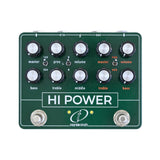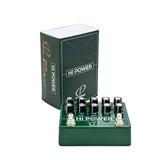HI POWER is Crazy Tube Circuits' next endeavor in pedal + amp-in-a-box overdrives recreating legendary sounds, following the success of Crossfire and Unobtanium. It was inspired by the sonic combination of two British tone machines. The almighty Colorsound Power Boost meets the blistering high-headroom Hiwatt amp. While the combination of these two units directly hints at the gear setup of David Gilmour and especially the gear used on Pink Floyd’s album: Wish You Were Here (think the guitar solo sounds of “Shine on you Crazy Diamond,” “Have A Cigar”), the sonic options are endless.
The orange enclosure silicon transistor circuit (Colorsound Power Boost) can deliver from a transparent clean boost to an all-out fuzz driving a tube amp to sonic bliss. The aim was to clone the original unit featuring the true-to-the-original spec BC184 transistors running on 18V DC (via an internal voltage booster circuit). The ultra-flexible 2-band Baxandall EQ circuit can add bite and low-end rumble to any setup. Used is a reverse log gain pot (labeled as volume), compared to the linear taper pot found in the original units and acted as an on/off switch, to be able to set the amount of boost/overdrive more precisely. While the earlier units didn’t feature a master volume control (only as an aftermarket mod – Pete Cornish made an external unit master volume for David Gilmour’s Power Boost), there is one included that is set up so that when it is all the way clockwise, it is bypassed. Later versions of the Power Boost had a 9V power supply and were renamed as the “Overdriver” due to the lower headroom and their ability to drive the signal earlier. They were offered in a grey enclosure and can be seen in the gear setups of Jeff Beck, Marc Bolan, etc. This version is also incorporated with a flip of a toggle switch (PWR-ODR toggle switch).
On the left side of HI POWER, you will find an all-analog circuit set out to emulate the sound and feel of a Hiwatt amp. Following the path of the famed British tube amplifier, our circuit offers authentic amp tone and feel resembling guitar tones from guitar greats like David Gilmour, Pete Townsend, Jimmy Page, Noel Gallagher, to name a few. From the big bold high-headroom clean sounds to the face-melting crunchy tones. True to the last detail, the full EQ section is included along with a presence control located at the negative feedback of the power amp simulation circuit. A headroom toggle switch selects between the high headroom 100w power section provided by a quartet of EL34s (think Hiwat DR103), or the lower headroom and compression provided by a 50W power section with a pair of EL34s when hit hard (think DR504). Similar in operation to the original amps, the master volume was designed to produce more gain at higher settings. The design is taken a step further by adding a switch to select between input channels of the amplifier. You can select between the full response of the normal channel of the amplifier, the increased presence and tight low end of the bright channel input, or the “gilmourish” enhanced frequency response and added gain of those inputs linked together. This follows the modifications that Pete Cornish did to all David Gilmour’s Hiwatt amps.
Like Crazy Tube Circuits' other dual overdrive/amp-in-a-box designs, a passive effects loop is also included to give you the option to connect your beloved pedals between your booster/overdrive and amp in a box or use the two sections as separate and independent effects when using an external bypass switcher / looper. Gilmour enthusiasts will love to insert their Big Muff, Tube Driver, and Phase 90 in there. Note that all pedals inserted in the passive effects loop are still in the signal chain when any or both sections of HI POWER are in bypass.
HI POWER features a power-up bypass/engage pre-set function for the footswitches. That way, you can select which state your pedal will go to when you plug in the power supply. This function comes in especially handy for people who use remote pedal switchers / loopers as they only set the state of the pedal once and then operate from the controller.




